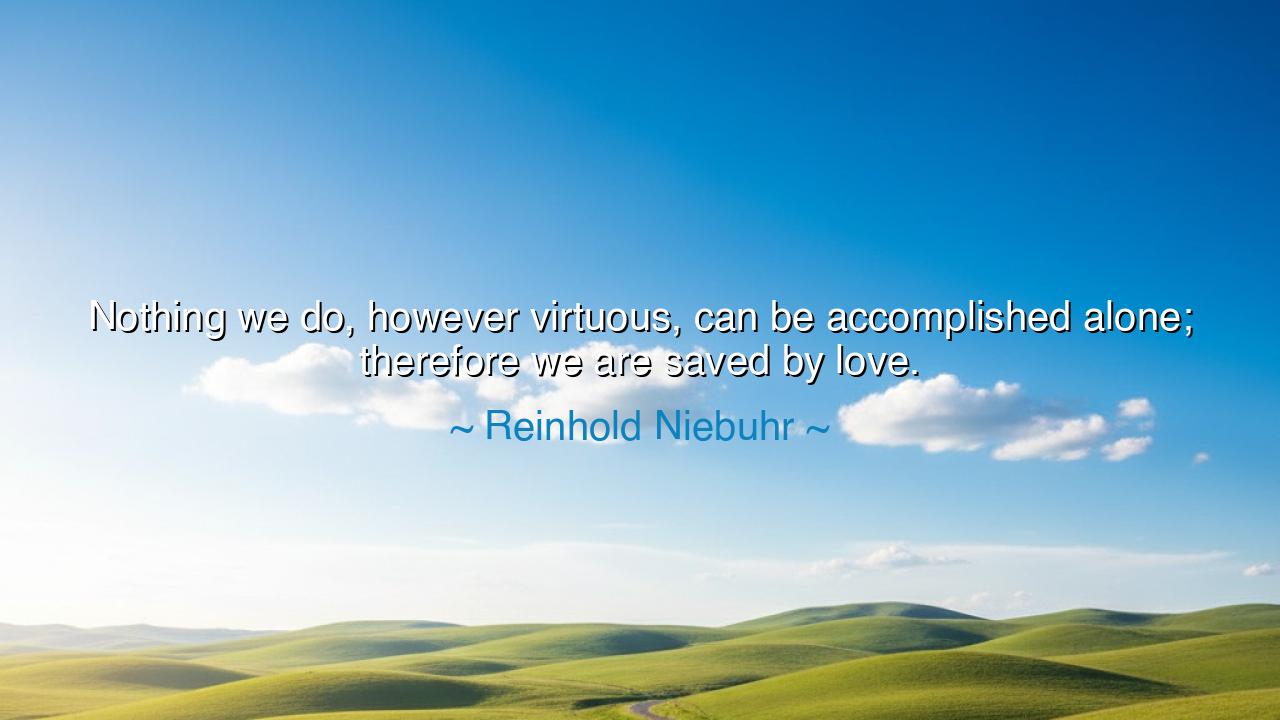
Nothing we do, however virtuous, can be accomplished alone;
Nothing we do, however virtuous, can be accomplished alone; therefore we are saved by love.






"Nothing we do, however virtuous, can be accomplished alone; therefore we are saved by love." These powerful words by Reinhold Niebuhr resonate deeply with the truth of human existence: that love is the very force that connects us to one another and makes all great deeds possible. Though we may strive for virtue in our actions, it is in the collective bond of human connection—in the love we offer and receive—that our efforts are given meaning and strength. Virtue and goodness are not solitary achievements, but shared experiences, forged in the hearts and hands of those who come together in pursuit of a common goal.
In the ancient world, love was considered the highest of all virtues. The Greeks spoke of agape, the selfless love that binds communities together, and eros, the passionate love that drives people to greatness. But even in the pursuit of heroic deeds or personal excellence, the greatest figures of antiquity knew that they could not stand alone. Homer's Iliad shows us how the warriors, though strong and courageous, relied on their comrades in arms to achieve victory. The heroes—Achilles, Hector, and Odysseus—were all bound by ties of love and loyalty, and it was in fighting together that they achieved greatness. Without each other, their victories would have been hollow, and their deeds would have been forgotten.
Consider the philosophers of ancient Greece, whose great works were the result of not only their own brilliance but the collaboration of minds. Socrates did not achieve wisdom alone; he had his disciples—Plato, Aristotle, and others—who engaged in dialogue, challenging each other’s ideas and shaping their collective understanding. It was their love for knowledge, their love for truth, and their shared commitment to understanding the world that made their ideas endure. Even in solitude, their minds were shaped by the love of learning, the love of growth, and the understanding that truth was something to be discovered together, not in isolation.
The same is true of the great social reformers throughout history. Mahatma Gandhi, though a towering figure of individual strength, could not have achieved his vision of Indian independence without the love and support of countless followers. His life and his movement were built not only on the foundation of his own personal sacrifice, but on the collective love of a nation striving for freedom. Martin Luther King Jr. echoed this truth in his struggle for civil rights. His courage and vision were sustained by the love of those who marched with him, by the deep bonds of solidarity that united people in the pursuit of justice and equality. Alone, these great figures would have been powerless; it was through the love of the people around them that they were able to accomplish the impossible.
In our own lives, it is often easy to think that our personal efforts are enough to achieve success or to bring about change. We may believe that if we work hard enough, our virtue alone will carry us to our destination. Yet, the truth is that nothing significant is ever accomplished alone. Whether in our families, communities, or in the world at large, we are saved by love—by the love we give and the love we receive. It is this love that strengthens our resolve, helps us to overcome adversity, and carries us forward when our own strength falters. Love, in its many forms, is the force that binds us, that encourages us to move beyond ourselves and work for a greater good.
Love is the furnace in which our virtues are tested and refined. It is through love that we learn humility, patience, and sacrifice. To love is to acknowledge that we are part of something greater than ourselves, that our lives are intertwined with the lives of others. It is the very heart of community, the force that drives us to act selflessly and to seek the welfare of others. When we love, we find the strength to persevere in the face of challenges, to continue fighting for what is right, even when the road is long and difficult.
The lesson from Niebuhr's words is clear: success, whether in personal growth or collective action, is not the result of individual effort alone. We are not isolated beings, but part of a great web of human connection. It is through love—the love we share with others—that we are able to achieve our highest potential and make a meaningful impact on the world. Virtue alone is not enough; we must allow ourselves to be supported, to give love, and to receive love in return. Love is the pathway to all true success.
In our daily lives, we should strive to cultivate love in all our actions. Let us not isolate ourselves in the pursuit of personal achievement, but instead, let us open our hearts to others, offering our support, compassion, and solidarity. Let us recognize that true success is not measured by what we can do alone, but by the relationships we build, the love we share, and the collective efforts we make to improve the world around us. As Niebuhr so beautifully reminds us, we are saved by love—and it is through love that we become part of something far greater than ourselves.






AAdministratorAdministrator
Welcome, honored guests. Please leave a comment, we will respond soon